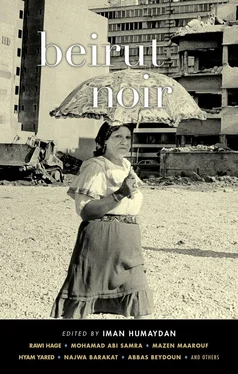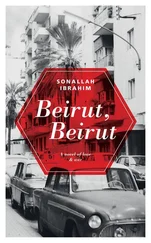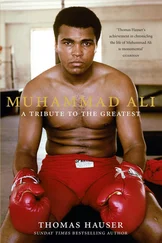I felt sick when I saw the mounds of rubbish rising up out of pools of water and I crossed the street. It didn’t feel like morning. The morning meant that a new opportunity — washed and clean — would augur another day.
The morning was dead in my eyes.
The street wasn’t how I once knew it. For a long time now, the morning has been overshadowed.
Years ago, I used to sit in the Wimpy coffee shop in Hamra in the morning and look out the window at the people on the street. I felt that Beirut was waking up from its slumber little by little, movement crept along little by little, and noise crawled by little by little. The sight of the workers was beautiful, when they were rushing to their jobs. Now there aren’t any workers left in the city, nor does the city wake up to the sound of their shoes. Armed fighters have taken over everything. Workers are now clothing vendors or fighters on the many front lines. Whenever more battle lines are drawn, more workers disappear. The city wakes up today without mornings to indicate the start of work. At least the scent of morning is no longer present, so people don’t wash the traces of the day before off their faces; they continue to live yesterday.
I don’t like yesterday.
Yesterday’s scent was on my body, on Beirut’s body, and the scent of the news of the crime against that woman was in my chest. The scent of people’s eyes resembled each other, though the eyes of faces were alone and sad and closed like those iron gates placed in front of the doors of houses.
People feel that they are isolated from one other. Bodies move. As if they are beings with no relationship to each other, though they say that people group into different types of clusters. I don’t believe this, and faced with this feeling I almost hope that my eyes will be dead.
But the scent of death emanating from the passersby unites them. Before, the street used to take on the scent of people along with the scent of the buildings.
I used to walk on the sidewalk, even though there wasn’t really a sidewalk anymore. Just as inhabitants of the houses in Beirut changed, the sidewalks changed. The houses in the city disappeared and the sidewalks disappeared. The sound of shoes on the sidewalk couldn’t be heard anymore, only the sound of selling. Every vendor takes a share of the sidewalk, sitting there with his wares. Clothes hang on Beirut’s sidewalks and walls and from balconies. It seemed to me that the city had changed a lot, or perhaps had disappeared. They say that time is more powerful than anything else. Things change but people only yearn for the past. They only believe their memory.
The past is the origin and the origins are lost.
A sense of loss pervaded everything, and I almost got lost. Where was I going? I forgot that I am also a worker. The sound of my shoes didn’t rise up anymore, only the voice of a taxi driver. He screamed at me and I walked over to him. I approached the car as if I wanted to flee from my exhausted head, the exhausting street, and the exhausting city — the closed faces like the locked iron gates in front of the houses.
For a long time, the doors to houses weren’t locked. I remember that our neighbor didn’t lock her house out of embarrassment, so it wouldn’t seem like she was in a conflict with my mother. My mother also used to do that. The two houses were always open except when there was a fight between the two families. Now all doors are locked. Perhaps anger blinds people’s hearts, or perhaps fear. But the city is locked up on itself, people are locked up on themselves, each sect on itself, each face on its features.
Metal doors are heavy. I shut the metal door to the car, sliding into the backseat.
I told the driver, “Good morning.”
He smiled, saying, “Good morning.”
After the taxi had driven for a while, a woman got in. Her body was wrapped up in gray and her face was covered in a gray cloth hung around her ears on both sides. She said loudly, “Salaamu alaykum.” The driver answered, “Salaamu alaykum.” Then he glanced at me in the rearview mirror, reminding me that I hadn’t said Salaamu alaykum. He suddenly got mad at me, his face turning angry. “Where’s the salaam, the peace?”
“Perhaps it won’t come to us,” the woman said. I didn’t think anything more of it then. I was only thinking about getting to the place where the crime had occurred, and that the woman sitting next to me didn’t have a scent like my grandmother’s.
“Where’s the salaam from?”
I tried to press myself harder against the door on my side of the car.
The driver almost crashed into the beggar who always stands in the middle of the street. This man has a strange shape. He looks as if he’s balancing precariously on a tightrope with one foot.
One of his legs was longer than the other. One eye higher than the other, one hand longer than the other, and the right side of his mouth was raised up higher than the left. He seemed blinded by fear. He was shaking violently. Sometimes when he approaches the car with his hand outstretched to take money he looks like he might topple over. He can’t balance. He is a lump of a ruin, or a lump of a little war of destruction. Again and again I’m afraid that I’ll hit him with my car and he will fall on the ground dead. His appearance frightens me so I always try to change my route home so I won’t crash into him.
I used to feel that I hated him. He made me nervous whenever I saw him. I don’t know why I grew afraid every time I glimpsed this young man.
For a split second I almost screamed at the driver — I thought he was going to hit him — but I quickly put my hand over my mouth.
What are you thinking, girl ? I was really afraid of this.
I rested on the metal car door and felt like crying. But I was too embarrassed to cry there in the car. They wouldn’t understand and would ask me what was wrong. How could I say that I really want the driver to kill this beggar who I’m afraid of? In the best-case scenario, they would call me insane. Perhaps they would say, She’s right. For sure, I’m more afraid of what their answer would be.
I thought of going to the doctor and telling him about this. But if he diagnosed me as abnormal, I wouldn’t be able to explain it to him. Killing scares me, and even the idea of killing terrifies me. My eyes overflowed with tears, I almost wept aloud.
Another male passenger looked over and I turned my head away. Then I really did cry and everyone in the car started staring at me. My crying grew much louder.
My grandmother used to say that crying doesn’t bring sadness, but rather washes your heart, that crying is relief.
Why did I want to kill that shaky, scary man? Perhaps out of weakness — because everyone else is killing. People who aren’t killing in the city don’t feel their own existence. For a moment I sensed the secret of my hatred for that man. It was like looking at him in a mirror: I observed people in the road, they all looked like him. The walls of the city, the roads, and the country and its economy — everything was him. He was a summary of what’s inside all of us.
All of us resemble him inside. The country is this man. So I’m scared of him. I am scared of the truth. The ugly truth. I don’t like it. We all shake like him and the earth beneath our feet shakes like him too.
Again and again, I’ve changed my route so I won’t run into him, but it’s in vain. Whenever I go out on the street I see him there. Even though he can barely walk, you see him wherever you go. So I avoid looking at him, and when I’m driving I close my window whenever he approaches. I tremble when he knocks on the glass with his fingers, and the moments when I stop in traffic feel like an eternity.
My fingers had pins and needles, as if my blood couldn’t reach them, as if all the blood was pooled in my head. I smelled the scent of blood in the taxi. I looked around me but didn’t find any trace of it. The scent of blood increased when the driver turned on the radio.
Читать дальше












